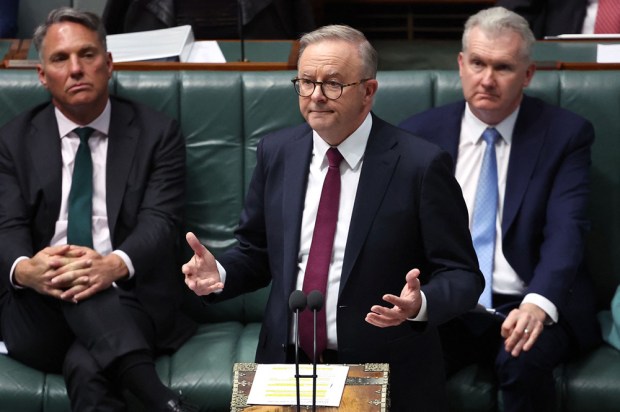‘I feel sick in the stomach,’ Queensland’s Labor Premier Annastacia Palaszczuk lamented when she learned of the criminal record of her new member for Cook, Billy Gordon. Along with the opposition and, at least according to polling, the public, she concluded that he should no longer sit in Parliament. He is however likely to serve a full term.
There is a tried and tested solution used in advanced democracies − give the people the power to initiate a recall election. Gordon’s convictions included breaking, entering and stealing, creating a public nuisance, and breaching the terms of both his bail and probation. All committed in his youth, Gordon’s moral offence was to conceal this. There was more. An apprehended violence order had been taken out in 2008 by his mother (although she denies she sought this) together with allegations he failed to pay child support and assaulted his partner and another woman. On these he is of course entitled to the presumption of innocence.
Ms Palaszczuk removed Gordon’s status as an ALP MP and although it would have resulted in a by-election and potentially a defeat of her government, called on him to resign. Gordon refused, but is expected to vote with Labor on most legislation; the government should be able to count on at least 45 votes out of 89 in the single chamber Parliament. Despite calls to the contrary, the Premier can’t reject Gordon’s vote. She could achieve the same result by arranging for a Labor MP not to vote, but she shows no intention of doing this. Her position is now less precarious than originally thought. Two Katter Australian Party MPs have indicated they do not wish to bring down the government, who will now no doubt reciprocate on aspects of their agenda.
The most likely way Gordon could lose his seat is if the untested allegations of violence were to result in a successful criminal prosecution with his being sentenced to more than 1 year’s imprisonment. There is one other possibility, but this would be drawing a very long bow. Parliament could expel him on the ground that his conduct makes him unfit to be an MP and that his continuing presence prevents them from exercising their functions with mutual respect, trust and candour; that Parliament has been brought into disrepute and its authority and dignity lowered. That would be a tall order, one difficult to defend in court.
The last federal expulsion (well before the power to do this was abolished) was of Hugh Mahon in 1920, after he denounced the British Empire as this ‘bloody and accursed despotism’. The last expulsion of a state MP was in New South Wales in 1969, following a notorious case which entertained Sydney for two months. It was brought by prominent businessman Alexander Barton against well known Country Party MLC Alexander Armstrong. Armstrong had threatened to murder Barton unless he signed agreements to pay him substantial sums. Armstrong’s credibility as a witness was destroyed when it was revealed he had asked a lady – whom he subsequently married – if she knew anyone who would falsely swear to adultery. Although Armstrong’s expulsion was upheld, comment in a later case suggests judges are inclined to raise the bar. On these facts, an attempt to expel Gordon would probably fail, meaning when it comes to ensuring the accountability of politicians between elections there is a vacuum.
Electors were told some years ago that if only politicians had more time in office they would govern more effectively. But when four year terms were introduced, if anything, the quality of government declined. To ensure good government the people should be able to do what they can when other services are below standard − dismiss the supplier.
Take, for example, the Whitlam government. There were widespread calls for an early election in 1975. Without a resignation, this could only be achieved by withholding supply and compelling the Governor-General to act. Although seriously attempted 170 times by Labor, its use against Whitlam led to enormous bitterness and division.
It would be far better in this and such cases as Billy Gordon’s or Craig Thomson’s if the people could have had recourse to those recall elections about which NSW Premier Barry O’Farrell was once so enthusiastic. He even borrowed words from Abraham Lincoln to declare that recall elections would ensure that ‘government of the people, by the people, for the people shall not perish on the earth.’ His enthusiasm cooled after he won the 2011 election and a carefully selected panel actually recommended, 2:3, in favour of recall elections. Nothing further was heard about this until some months later when a listener asked 2GB’s Alan Jones about recall elections. On his inquiry, the premier’s office said these were not taken up because the panel had recommended against them.
Recall elections are well known in other countries, especially in a number of US states and in one Canadian province, demonstrating their compatibility with the Westminster system. Despite the low number needed to trigger a recall election in some Swiss cantons, ranging from 30,000 down to as low as 600 in smaller ones, they are rarely used. This is probably because Swiss voters can directly initiate legislation through citizen initiated referendums (CIR).
A petition for a recall election must be signed by a minimum number of voters, preferably a percentage of the electorate. This should be high enough to prevent any abuse of the process by frivolous petitions, but not too high. After all, signing a petition is a very public act, and far more serious than giving an anonymous opinion in a poll. Many people will be reluctant to sign for that reason.
In the US a successful recall petition usually requires more signatures than a CIR petition, and ranges from a high of 40 per cent down to 12 per cent. Australia’s federation was achieved under the Corowa Plan which required a directly elected convention and an understanding its recommendations would be put to a referendum.Premier Palaszczuk’s best course of action would be to persuade the PM, her fellow Premiers and Chief Ministers that this − and other significant constitutional issues −be referred to an elected and unpaid convention operating outside of the usual political hot house.
Got something to add? Join the discussion and comment below.
Get 10 issues for just $10
Subscribe to The Spectator Australia today for the next 10 magazine issues, plus full online access, for just $10.
You might disagree with half of it, but you’ll enjoy reading all of it. Try your first month for free, then just $2 a week for the remainder of your first year.













Comments
Don't miss out
Join the conversation with other Spectator Australia readers. Subscribe to leave a comment.
SUBSCRIBEAlready a subscriber? Log in